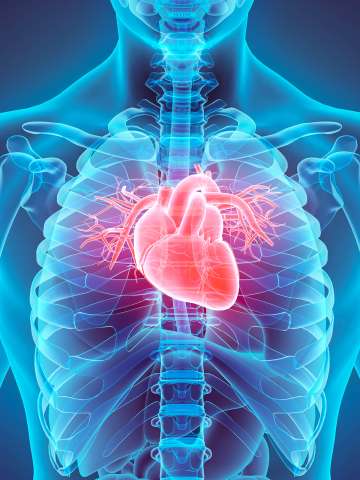Understanding the Significance of Cardiology in Modern Health Care Solutions
Cardiology plays a critical duty in contemporary healthcare, particularly as heart problem remains to be the leading root cause of death worldwide. Developments in diagnostics and treatment have actually changed patient treatment, enabling earlier treatments and boosted end results. In addition, the change towards preventive cardiology encourages individuals to handle their wellness proactively. As technology proceeds to progress, the combination of cutting-edge solutions may even more redefine cardiology's impact on public wellness, prompting a more detailed evaluation of emerging trends and their ramifications.
The Occurrence of Heart Illness and Its Effect On Public Health And Wellness
Although heart problem continues to be the leading reason of death around the world, its impact expands far past specific people to impact public health systems and economies. The high frequency of heart problem puts a substantial stress on healthcare sources, demanding raised funding for rehabilitation, therapy, and avoidance programs. Public health initiatives need to address threat factors such as excessive weight, smoking cigarettes, and inactive way of lives, which contribute considerably to the rising incidence of heart conditions.Moreover, the financial problem related to heart problem is immense, encompassing not only direct medical costs however likewise indirect costs associated with lost efficiency and premature death. Neighborhoods deal with obstacles in managing these costs, usually resulting in differences in healthcare gain access to and outcomes. As the populace ages and lifestyle-related threats continue to escalate, the necessity for effective cardiology treatments ends up being critical. Addressing heart illness is not just a matter of private wellness but additionally an important public health and wellness concern.
Advancements in Heart Diagnostics and Imaging Techniques
Recent developments in cardiac diagnostics and imaging strategies have revolutionized the area of cardiology, boosting the capability to identify and keep an eye on heart problem. Strategies such as cardiac MRI, CT angiography, and echocardiography have come to be progressively innovative, offering thorough images of heart structures and functions. These modalities enable the early recognition of conditions like coronary artery condition, heart failure, and valvular disorders.Moreover, innovations in non-invasive diagnostics, such as wearable innovation and remote tracking tools, have encouraged individuals and healthcare suppliers. These tools help with real-time tracking of heart rhythms and various other important signs, bring about timely treatments. Furthermore, artificial knowledge is being integrated right into imaging evaluation, improving accuracy and effectiveness in diagnosis.
Technologies in Treatment Options for Heart Conditions
Current innovations in cardiology have led to considerable technologies in treatment alternatives for heart disease. These include sophisticated medical techniques that enhance step-by-step results and emerging medicines that offer brand-new opportunities for therapy. As the field progresses, these technologies play an important function in enhancing patient care and results.
Advanced Surgical Techniques
Advancements in medical strategies have actually transformed the landscape of cardiology, offering brand-new expect people with heart disease. Minimally invasive treatments, such as catheter-based treatments, have actually significantly decreased recuperation times and healthcare facility remains. Techniques like robotic-assisted surgical treatment improve precision, permitting surgeons to navigate complicated physiological frameworks with higher accuracy. In addition, advancements in imaging technology facilitate real-time visualization throughout treatments, boosting outcomes. Transcatheter aortic valve replacement (TAVR) exemplifies a development in treating aortic stenosis, allowing shutoff substitute without open-heart surgery. In addition, hybrid strategies that incorporate surgical and catheter-based approaches offer tailored solutions for various heart issues. These innovative medical methods not just boost individual safety however likewise increase treatment choices, emphasizing the essential duty of development in modern cardiology techniques.
Arising Drugs and Treatments
As the landscape of cardiology proceeds to advance, emerging therapies and medicines play a critical role in improving treatment options for heart conditions. Innovations such as novel anticoagulants and advanced lipid-lowering agents have actually changed the monitoring of cardio illness, significantly decreasing individual morbidity and mortality. In addition, the growth of genetics therapies and regenerative medication uses encouraging methods for dealing with problems previously considered permanent. Medical trials are consistently revealing the effectiveness of these treatments, pushing the borders of standard treatments. The assimilation of digital health technologies facilitates individualized medicine, enabling for customized therapy plans based on hereditary and way of life factors. Jointly, these innovations emphasize the dynamic nature of cardiology, enhancing person results and redefining criteria of treatment in contemporary medical care.
The Duty of Preventive Cardiology in Patient Treatment
Precautionary cardiology plays a necessary duty in patient treatment by focusing on the identification of risk factors that add to heart problem. Through lifestyle adjustment techniques and very early detection strategies, doctor can effectively reduce the incidence of cardio events - Cardiologist near me. This positive method not just enhances client end results but likewise promotes lasting health
Threat Factor Recognition
While cardio diseases continue to be a leading source of morbidity and death worldwide, effective threat factor identification serves as a cornerstone of preventative cardiology. Recognizing danger elements such as hypertension, hyperlipidemia, diabetes mellitus, and household history is essential for very early treatment. Health care specialists use various screening approaches to assess these aspects, enabling for tailored safety nets. Furthermore, recognizing a client's way of life selections, such as cigarette smoking and physical lack of exercise, additionally informs risk assessments. This complete evaluation enables clinicians to establish customized care plans targeted at mitigating risks. By focusing on threat variable identification, medical care systems can enhance patient outcomes and decrease the overall problem of cardio conditions, ultimately adding to improved public health methods and source allowance.
Way Of Living Adjustment Strategies
A plethora of research studies highlights the crucial duty of way of life modification techniques in minimizing cardio condition danger. These techniques incorporate dietary changes, raised exercise, smoking cigarettes cessation, and weight monitoring. By taking on a heart-healthy diet regimen abundant in fruits, veggies, whole grains, and lean proteins, individuals can lower cholesterol degrees and high blood pressure. Routine exercise strengthens the heart and improves general cardio wellness. Furthermore, quitting cigarette smoking substantially reduces the risk of heart problem and improves recovery rates for those with status quo. Weight management additionally contributes to cardio health by minimizing various other threat factors such as diabetes mellitus and high blood pressure. Carrying out these way of living alters not just advertises specific well-being however also works as a foundation of precautionary cardiology in person treatment.
Very Early Detection Techniques
Way of life alterations significantly contribute to decreasing heart disease risks, however they are most reliable when matched with early detection methods. Preventive cardiology highlights the significance of identifying potential heart concerns before they escalate right into serious problems. Strategies such as blood pressure tracking, cholesterol screening, and advanced imaging modern technologies like echocardiograms play essential functions in assessing cardio wellness. Biomarkers and hereditary testing additionally enhance the precision of early detection, enabling tailored preventive methods. Routine cardiac danger evaluations empower health care suppliers to intervene proactively, potentially preventing cardiovascular disease and strokes (Cardiologist near me). By integrating these early detection approaches into regular care, individuals can gain from timely way of living treatments and targeted therapies, eventually enhancing results and boosting lifestyle
Integrating Innovation Into Cardiology Practices
As improvements in modern technology remain to improve numerous fields, the combination of innovative tools and systems into cardiology methods has come to be essential for enhancing client care and outcomes. Telemedicine platforms permit cardiologists to check individuals from another location, boosting access to care while minimizing the concern on medical care facilities. Wearable devices, such as smartwatches, enable continuous heart rate surveillance, notifying both individuals and doctors to potential concerns in real-time. Furthermore, expert system (AI) is being used to analyze vast amounts of cardiac information, aiding in very early medical diagnosis and individualized therapy strategies. Advanced imaging techniques, consisting of 3D echocardiography, improve visualization of heart structures, causing extra exact treatments. Digital health and wellness documents (EHRs) enhance patient details management, ensuring that cardiologists have instant accessibility to critical data. Together, these technological innovations are transforming cardiology, promoting proactive monitoring and a fantastic read enhanced health results for patients with cardio problems.
The Importance of Person Education and Engagement
Individual education and learning and engagement play a crucial function in the management of cardiovascular wellness. By equipping clients with expertise concerning their conditions, therapy choices, and lifestyle modifications, doctor equip individuals to take an active duty in their care. This proactive strategy can lead to boosted adherence to suggested medications, nutritional changes, and exercise routines, inevitably reducing the risk of complications.Engagement additionally cultivates a strong patient-provider connection, motivating open communication and trust. When clients really feel educated and included, they are more probable to voice worries and ask inquiries, which can cause much view it now better clinical end results. Additionally, instructional resources, such as workshops or digital systems, can enhance understanding and promote self-management strategies. Generally, focusing on client education and involvement is vital for enhancing cardio wellness, boosting high quality of life, and reducing health care costs connected with cardio conditions.
Future Fads in Cardiology and Their Possible Influence

Frequently Asked Concerns
What Way Of Life Adjustments Can Reduce Heart Condition Danger?
The present inquiry addresses way of living changes that can substantially decrease heart problem risk. Dr Garcia. Embracing a balanced diet plan, participating in normal exercise, preserving a healthy and balanced weight, taking care of stress, and staying clear of tobacco can notably enhance cardio wellness
Exactly How Can I Recognize Early Signs of Heart Issues?
Identifying very early indications of heart problems entails monitoring signs such as breast pain, shortness of breath, exhaustion, and uneven heart beat. Prompt awareness of these signs can prompt essential clinical assessment and treatment for far better results.
What Are the Differences In Between Cardiologists and Heart Surgeons?
The differences between cardiologists and heart surgeons lie in their functions; cardiologists largely handle and diagnose heart disease through non-invasive approaches, while cardiac cosmetic surgeons perform surgeries to deal with architectural heart problems. Each plays an essential, unique role.

Exactly how Often Should I Get My Heart Health And Wellness Checked?
The regularity of heart medical examination differs based on individual danger elements. Typically, adults need to undergo analyses every one to two years, while those with status quo may require even more regular evaluations as advised by healthcare professionals.
What Role Does Genes Play in Heart Problem Risk?
Genes greatly affects heart illness danger, with domestic patterns indicating acquired conditions. Details genes can incline individuals to hypertension, cholesterol issues, and various other cardio problems, highlighting the relevance of hereditary testing in assessing heart health and wellness. Heart click now illness stays the leading cause of fatality worldwide, its impact prolongs far beyond private clients to impact public health systems and economies. Public wellness initiatives must address risk factors such as weight problems, smoking cigarettes, and sedentary way of lives, which add significantly to the climbing incidence of heart conditions.Moreover, the economic concern linked with heart illness is immense, including not just straight medical prices however also indirect expenditures associated to lost efficiency and early mortality. Preventative cardiology plays a crucial duty in patient care by focusing on the identification of risk elements that contribute to heart illness. Artificial intelligence (AI) and machine learning are enhancing diagnostics and individual surveillance, allowing very early detection of heart diseases. The distinctions between cardiologists and heart cosmetic surgeons lie in their roles; cardiologists primarily identify and manage heart problems through non-invasive approaches, while cardiac doctors carry out medical procedures to fix structural heart problems.